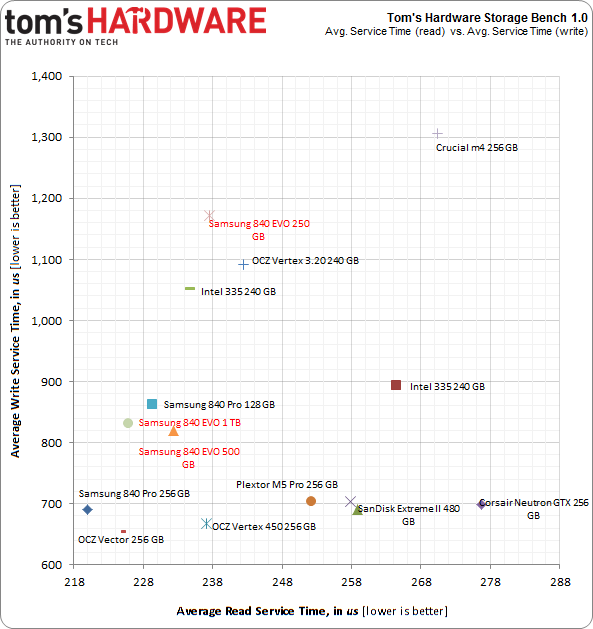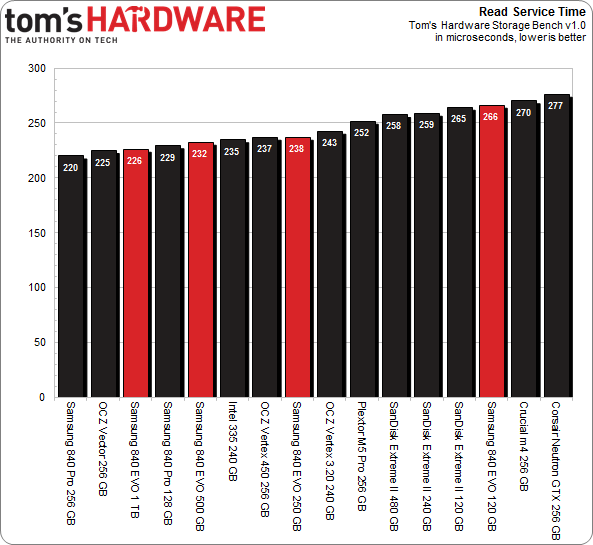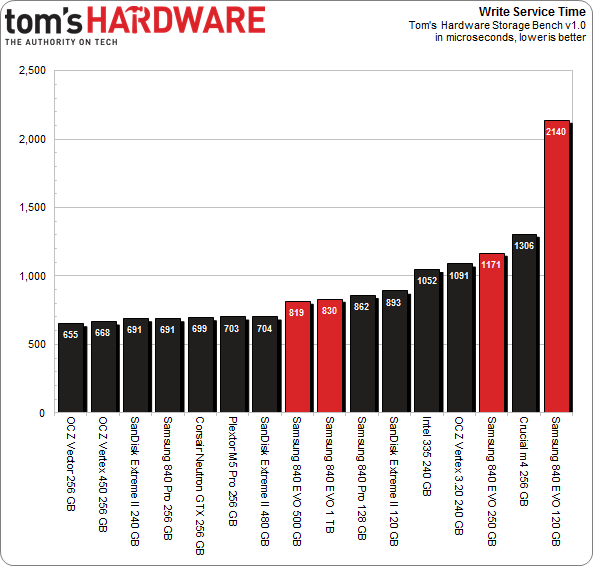Samsung 840 EVO SSD: Tested At 120, 250, 500, And 1000 GB
Last week, Samsung unveiled a successor to its wildly popular 840 at the company's Global SSD Summit in Seoul, South Korea. Stacked with a series of new features and 19 nm, three-bit-per-cell NAND, we benchmark four models and make a recommendation.
Results: Tom's Hardware Storage Bench, Continued
Service Times and Standard Deviation
Beyond the average data rate reported on the previous page, there's even more information we can collect from Tom's Storage Bench. For instance, mean (average) service times show what responsiveness is like on an average I/O during the trace.
It would be difficult to graph the 10 million I/Os that make up our test, so looking at the average time to service an I/O makes more sense. We can plot mean service times for reads against writes. That way, drives with better latency show up closer to the origin; lower numbers are better.
You really want to see your SSD serving up I/Os like a ninja tossing throwing stars (not altogether a bad analogy for I/O latency). He might be able to wing a number of them each second, but they all take time to reach their destination. If the host asks for a piece of data, how long does it take for the storage subsystem to respond with the right information? Splitting up read and write service times helps us understand each drive's strengths and weaknesses.
The 120 GB Samsung 840 EVO plots so far off the scale for writes that it's outside of our visible range.
All of the drives we're testing today demonstrate great mean read service times. Given their triple-level cell NAND, however, we have to give credit to Samsung's 840 EVOs for keeping up with the MLC-based competition.
The 840 Pro finishes just ahead of OCZ's Vector, and the 1 TB 840 EVO is just one microsecond behind. The 250 and 500 GB models fall in right after that, mixed in with the smaller 840 Pro, Intel's SSD 335, and the Vertex 450. Samsung's 120 GB 840 EVO is further back, though still in front of the 256 GB m4 and Neutron GTX.
Get Tom's Hardware's best news and in-depth reviews, straight to your inbox.
This trace has over twice as many read IOs as writes. But writes account for more throughput. And even thought the three-bit-per-cell flash should be slower, Toggle-mode NAND and a faster controller could be keeping the 840 EVO competitive.
The 120 GB 840 EVO stands out for its high latency. On average, Samsung's entry-level model took 2.14 ms to sevice a request, which is three times longer than the first-place Vector.
In fact, two Indilinx-powered drives from OCZ take first and second place, while SanDisk's Extreme II snatches the bronze. The largest 840 EVOs land right in the middle, which isn't bad given Samsung's architecture and the write-heavy nature of our trace. Although the 840 EVOs don't lead the field, if nothing else, we're pleased to see triple-level cell NAND keeping up with the MLC competition.
Current page: Results: Tom's Hardware Storage Bench, Continued
Prev Page Results: Tom's Hardware Storage Bench v1.0 Next Page Results: PCMark 7 And PCMark Vantage-
Someone Somewhere Surely it would make sense to compare it to the vanilla SSD840. Also, there's no 840 Pro in the power charts.Reply
While the 1TB drive coming down to ~65c/GB is nice, seeing the 120 GB drives get near there would be nice. Especially since this is meant to be the value king. -
drwho1 I have 2 840 pro 512 GB SSD's (1 on my notebook 1 on my PC)Reply
I got them on a sale on Newegg for around $500 for both of them. :)
A 1TB would be cool if I find it on sale....
or maybe I should try out writing a letter to someone fat in some weird red costume...
-
slomo4sho The performance gap between the 840 Evo and 840 Pro is discouraging for the lower capacity models. I understand that the Pro is the flagship product but I was expecting less of a gap in in the 120GB models since this is a newer generation product and the 840 Pro is still based on the 21nm MLC NAND. However, the 1TB model is is a great choice for mass SSD storage. Lets hope the prices drop below $0.50 per GB soon.Reply -
Someone Somewhere MLC is faster than TLC, and bigger node NAND is usually faster. Only reason to go smaller is price and power.Reply -
SteelCity1981 I wonder if samsung plans on releasing a pro evo series since the regular series evo is to replace the older non pro versions.Reply -
razor512 ripoff, high prices for triple level flash especially at 19mm, the lifespan will likely suck and their shortened warranty represents that.Reply -
master9716 Cost for performance = Very High . ofcourse its not going to perform like a Pro but for the cost im amazed its that much better than the Regular 840.Reply -
J_E_D_70 Glad this review also refutes the perception of low TLC write endurance in normal desktop workloads. Been using a 128GB 840 in a daily-use desktop for eight months now and the endurance counter hasn't decremented at all. I'll have replaced the entire rig long before it wears out.Reply -
JohnnyLucky Interesting review. I think the point to remember is that the 840 EVO is not a high end enthusiast ssd like the 840 Pro. Instead, consider the 840 EVO as a mainstream ssd suitable for most consumer and home office scenarios.Reply


